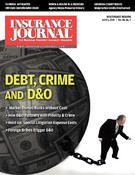As Insurance Commissioner Kevin McCarty told the Florida Cabinet, “the marketplace still faces serious challenges.”
Out of the more than 200 property insurance companies in Florida, 81 reported underwriting gains for 2009, while 100 reported underwriting losses.
These underwriting losses are occurring without a major storm. Insurance companies are under pressure from the recession, reduced investment yields and the soft market. In addition, McCarty and insurers have identified other cost drivers affecting Florida’s domestic insurers: increased reinsurance costs; replacement cost methodology; fraud; reported sinkhole claims; and premium reductions from the full implementation of mitigation discounts.
Fraud is a broad category and presumably includes the reopening with the aid of public adjusters of tons of hurricane claims four and five years after they were initially filed. This is one area where it appears everyone agrees reform is needed and legislation to curb these abuses is winding its way through the Legislature.
The faulty implementation of premium reductions for mitigation efforts is also a major contributor to the current financial mess and steps are being taken to correct this as well.
There appear to be several other factors missing from the list of reasons that might explain the precarious financial condition of so many insurers.
Artificially low rates for the state-backed Citizens Insurance can limit how much private insurers can charge if they care to retain market share. The Office of Insurance Regulation fears that if private insurers rates go up too much, then more property owners will choose Citizens. Citizens’ rates are now being raised gradually although not by as much as non-politicians think necessary.
There is also the matter of whether and how quickly private insurers’ rate filings are approved. The OIR denies that it was too tough on insurers in the past but it has been granting approvals at a healthy clip since the first of the year. More than 100 rate filings have been given the green light in the last three months.
“This is as a result of companies being able to quantify the cost-drivers, and the companies’ ability to persuasively incorporate their actuarial justifications and data into their rate filings,” an OIR spokesman told Insurance Journal.
Finally there are the recent indications that some domestic insurers may be playing a shell game by overpaying affiliated managing general agencies, reinsurers or other entities or, in one case, making a losing $600,000 investment in a bank owned by a director. So perhaps some of the “losses” are not real.
McCarty had these words for the Cabinet:
“Let me reassure you, we will not allow known troubled companies to enter hurricane season without the financial capacity to pay claims; those companies that do not have the financial wherewithal to pay these claims will be either re-capitalized, acquired, merged, or liquidated.”
With so many factors at play, the temptation is for each party with a stake to point a finger and wait on the other to make progress. Carriers wait for lawmakers. Lawmakers wait for OIR. OIR waits for reinsurers. Agents wait for carriers. Consumers wait for agents.
But the reality is that Mother Nature waits for nobody. Each and every stakeholder must do absolutely everything within its power and the law to advance financial security. Right now. No waiting.
Topics Carriers Legislation Florida Windstorm
Was this article valuable?
Here are more articles you may enjoy.


 Trump Demands $1 Billion From Harvard as Prolonged Standoff Appears to Deepen
Trump Demands $1 Billion From Harvard as Prolonged Standoff Appears to Deepen  Insurify Starts App With ChatGPT to Allow Consumers to Shop for Insurance
Insurify Starts App With ChatGPT to Allow Consumers to Shop for Insurance  Allstate CEO Wilson Takes on Affordability Issue During Earnings Call
Allstate CEO Wilson Takes on Affordability Issue During Earnings Call  BMW Recalls Hundreds of Thousands of Cars Over Fire Risk
BMW Recalls Hundreds of Thousands of Cars Over Fire Risk 


